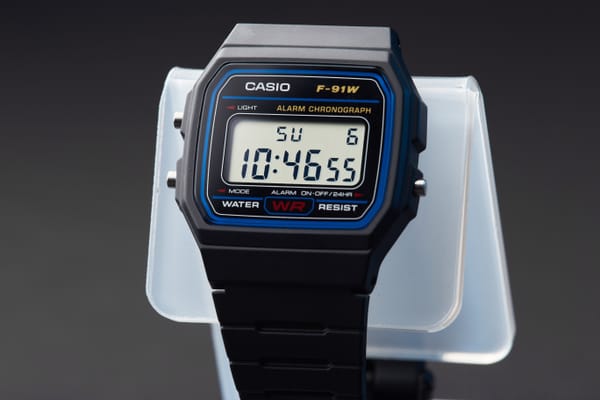You Can Still Be Friends With People Who You Disagree With
Instant text based messaging is undoubtedly the worst way to communicate when it comes to exchanging views on controversial topics. The valiant attempt of emojis aside, you have very little in the way of interpreting how something is intended to come across in a text message.

Decaf Journal is reader-supported. When you buy links through our site, we may earn an affiliate commission.
Carnivore vs Vegan. Atheist vs Christian. Conservative vs Liberal. Pro Choice vs Pro Life. Pro Guns vs Anti Guns. Covid-19 Vaccination Policy & Lockdowns.
Do you find strong emotions stirring up within you when thinking about any of these topics? Or to take it one step further, imagine having to debate someone who is on the opposite side of where you sit on the issue. Is your blood pressure starting to rise a little bit? I'm not exactly certain when it started to occur, but in the last fifteen years or so, civilized and reasonable discourse seem to have been all but lost ever since the majority of our communications have moved to the digital realm.
Recently, we've been programmed to discard one another if we aren't aligned on key issues. The all too common line of thinking goes like this, "You must choose a side, and if you're not on the right side then I won't associate with you any longer." On a personal level, this usually entails unfriending or unfollowing someone if you don't share the same beliefs. On a public mainstream level, this often means cancelling somebody outright so that they are silenced by attacks with the intent to strip them of their credibility or struggle to make a living.
Instant text based messaging is undoubtedly the worst way to communicate when it comes to exchanging views on controversial topics. The valiant attempt of emojis aside, you have very little in the way of interpreting how something is intended to come across in a text message, which leaves the door wide open for confusion, misunderstanding, and hurt feelings. Take the wink emoji 😉 for example. Is the person using it trying to be funny and cheeky or are they just kind of a prick? You'll probably never know unless you can see their face, their tone of voice, and their gestures in real time.
Thanks to algorithms which now by and large dictate the sources of information that we consume, social media creates an echo chamber for like minded users who can all agree on the same thing and rarely have their values questioned or challenged. It feels good to seemingly have the whole world agree with your worldview. Consequently, it becomes all the more traumatic to encounter someone who isn't in your camp and suddenly they're the enemy. When having a face to face discussion with someone, there's instant real life feedback, there's some nuance, there's going to be some give and take, some reasonable concessions made, and perhaps even someone will change their mind because of the interaction. Social media on the other hand is inherently designed for conflict. Why? For no other reason then it creates high engagement with the platform.
Save your debates and hard conversations for meaningful in person interactions. It takes no courage and very little effort to deliver your hot takes from behind the safety of your keyboard. When a disagreement arises with someone on the internet, suggest to take the conversation offline and meet up for coffee. And if that person is on the other side of the world, you should probably just have some humility, let it be, and redirect your limited energy to something that's actually productive and will benefit your life. Comments sections are generally dumpster fires to be avoided anyway. We've all seen countless cases of belligerent people writing short novels on the internet filled with anger and scathing remarks. Just imagine what they could build if only they would transform that negative energy and put it into something positive.
It wouldn't be a stretch to say that Western culture is rapidly crumbling all around us. Our society cannot improve without having open discussions that come from a place of humility and cooperation. Instead of digging our heels in and doubling down on our team's talking points, let's hear the other side's point of view. We may not, and certainly do not have to agree with them, but that's ok, just as it always has been. We've simply forgotten as a society that disagreement doesn't automatically equal hate. It would be absurd to think that someone will agree with you about absolutely everything, and the world would be a terribly boring place to exist if that were the case.
We should all strive for a higher standard of communication. Our world is increasingly complex, but the way that we interact is best kept to a relatively primitive level. That is, looking directly into a person's eyes when addressing them, as there is instinctive accountability that comes with real world human interactions. There are certain things you'd never say to someone's face but could easily declare on social media. Essentially lobbing verbal grenades from a safe distance and immediately ducking for cover to escape any deserved repercussions. If you don't have the guts to say it to someone in real life, you probably shouldn't be saying it at all.
And let's find common ground. The simple truth of the matter is that we likely have more in common with our misperceived enemies than we don't. Just because you don't agree on one issue, doesn't mean you won't agree on a wide range of other topics. We all love nature, we all love to laugh, we love great food & drink, and spending time with family. Even if there's no trace of seeing eye to eye, choose to love one another anyway. Love is not just a feeling, love is an action that you take, and it is often a hard choice to be made.
The late Anthony Bourdain said it perfectly:
Be open to a world where you may not understand or agree with the person next to you, but have a drink with them anyways.
You can, and should still be friends with people who you disagree with. This polarized world needs understanding more than ever.





